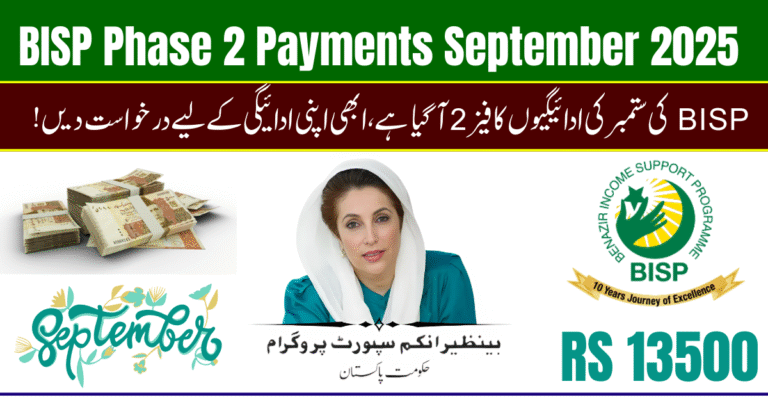BISP 8171 PMT Score Explained – How Your Payment Eligibility is Decided in September 2025
The Benazir Income Support Program (BISP 8171) plays a vital role in supporting low-income families across Pakistan. To ensure that financial aid reaches the most deserving households, the program uses a Proxy Means Test (PMT) score to assess eligibility. Many beneficiaries are often confused about how this score is calculated and how it affects their payments.
پاکستان میں بے نظیر انکم سپورٹ پروگرام نے لاکھوں خاندانوں کو مالی سہولت فراہم کی ہے۔ اس کے تحت دی جانے والی امداد کے لیے حکومت ایک خاص سکورنگ سسٹم استعمال کرتی ہے جسے پی ایم ٹی اسکور کہا جاتا ہے۔ اس کا مقصد یہ جانچنا ہے کہ کون سے گھرانے واقعی امداد کے مستحق ہیں اور کس معیار کے مطابق انہیں امداد دی جائے گی۔
What is the PMT Score in BISP 8171?
The PMT score is a tool used by the government to measure the economic status of a household. Through surveys and data collection, families are assigned a score between 0 and 100.
- A lower PMT score means the household is more financially vulnerable.
- A higher PMT score indicates better living conditions and less need for support.
Generally, families with a PMT score below 32 or 35 are considered eligible for BISP 8171 payments.
How BISP 8171 Collects Data for PMT Score
The National Socio-Economic Registry (NSER) survey is the main source of data for PMT calculation. Survey teams visit households and collect information on:
- Family income sources
- Household size
- Education levels
- Health conditions
- Type of housing (pucca, kacha, rented, or owned)
- Availability of basic facilities (electricity, gas, water)
- Assets such as vehicles, agricultural land, or businesses
This collected data is then processed to calculate a household’s PMT score.
Factors That Affect Your PMT Score
Several elements directly influence your BISP 8171 PMT score, including:
Household Income and Employment
Families with no regular income or unstable employment usually receive a low PMT score, making them more likely to qualify.
Housing Condition
Living in a kacha house or without proper facilities reduces the score, indicating financial struggle.
Education and Health Status
Households where children are not in school or where members face health challenges often receive priority.
Ownership of Assets
If a family owns land, vehicles, or a business, their PMT score is higher, which can disqualify them from receiving BISP payments.
Why PMT Score is Important for Beneficiaries
The PMT score system ensures that only the most deserving families receive financial support. Without it, funds could be misused or distributed unfairly. Beneficiaries should understand that:
- Payments are not random but based on transparent criteria.
- A higher PMT score means a reduced chance of eligibility.
- Updating household data is important to keep the score accurate.
BISP 8171 September 2025 Update
In the latest September 2025 update, BISP has tightened its verification process. Beneficiaries are being asked to re-check their PMT scores to confirm continued eligibility. Families with updated records are more likely to receive the Rs. 13,500 installment on time.
Conclusion
The BISP 8171 PMT score is the backbone of the eligibility process, ensuring that financial aid goes to those who need it most. Understanding how your score is measured can help you stay informed and avoid disqualification. By keeping your household information updated during NSER surveys, you can secure your place in the program and continue receiving support under the Benazir Income Support Program.











